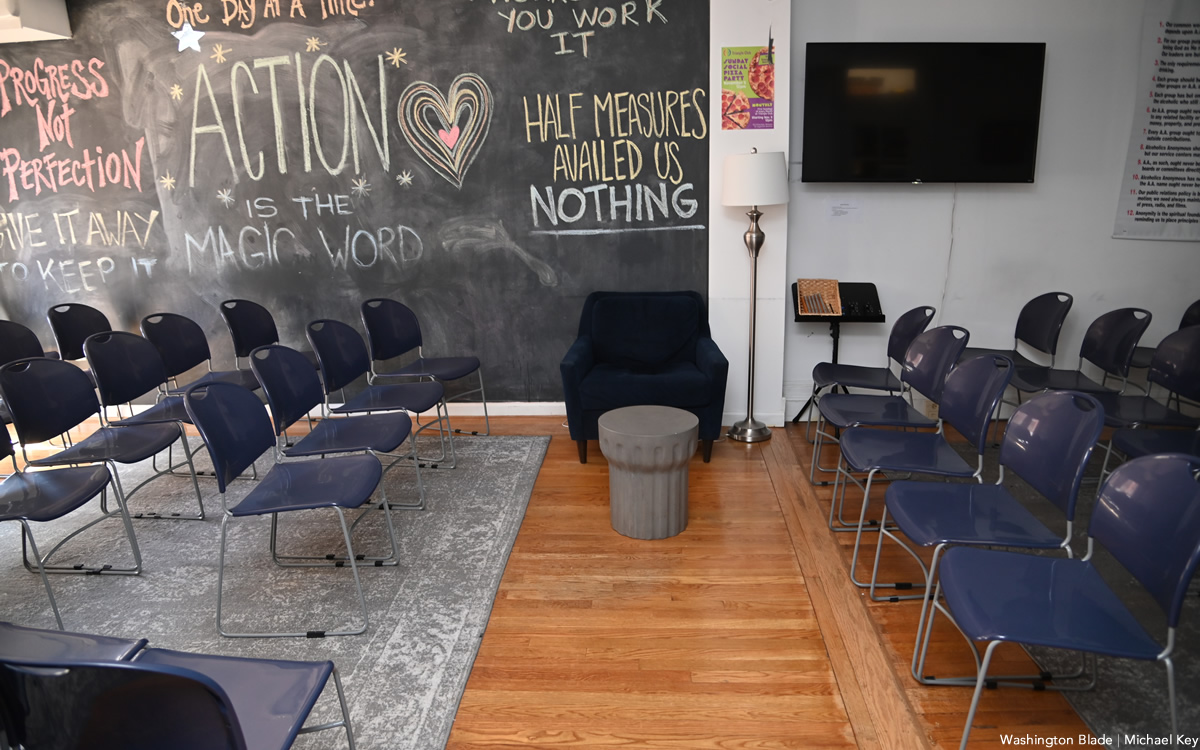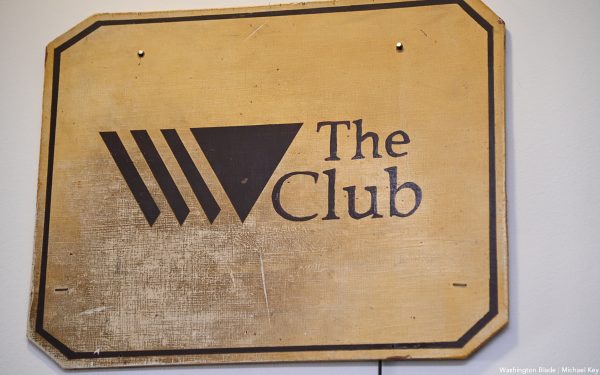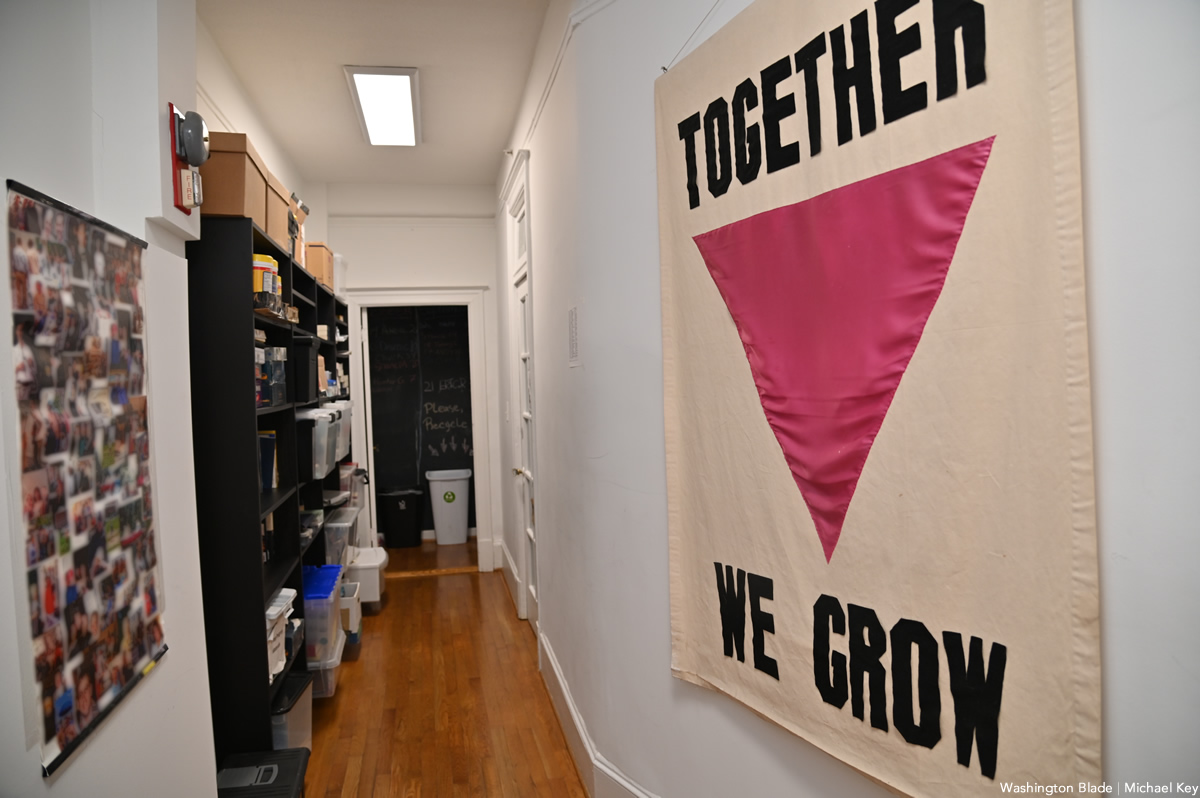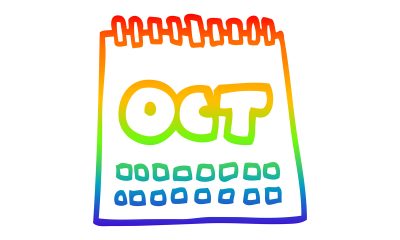District of Columbia
Recovery at the Triangle Club
Coming together as a group to fight a common addiction

On Sunday, between the Dupont Italian Kitchen, where the tables are filled with the boozy brunches of the kickball gays, and Mikko, where a young couple is celebrating their anniversary with some Champagne, the door to a row-house opens, and all at once, a crowd pours forth onto the stairs. Only the stairs keep on filling. These folks aren’t leaving. They’ve only left the building to come to the stairs, just to chat. It’s as though 100 people all decided to go for a smoke out front, all at the same time. But if you ask them why they’re there, you’ll get only the vaguest of answers. “We’re just coming from a meeting,” one will say. “It’s a clubhouse,” says another.
There are good reasons for this vagueness. The Triangle Club is a center for queer folk to attend recovery meetings: Overeaters Anonymous, Alcoholics Anonymous, Crystal Meth Anonymous, Sexual Compulsives Anonymous. It’s part of the very mission of these groups to protect the privacy of their members. But these groups also want those in the queer community who need the support to know that they’re there. And so the folks at the Triangle Club were kind enough to welcome the Blade into their space for a few meetings, to see how things worked and shed some light on what they’re all about.
The Club had its kickoff meeting in 1988, during the AIDS crisis. Churches weren’t particularly enthusiastic about hosting gay recovery meetings in their back rooms. And so the Club sought to provide a safe place for those meetings to take place. At the time of the club’s founding, it was estimated that gays and lesbians were twice as likely to report problems with alcohol abuse than heterosexuals. One would hope that things might have changed in the intervening years. But according to a government report released this summer, that figure has barely improved. (The government report did not collect any statistics on transgender people.)
Of course there is no single reason queer people develop problems with drugs and alcohol. But one in particular struck me, especially as a reason I heard coming from a lot of the younger folk at the Triangle Club. “I thought meth was a prerequisite for going out,” said one. “I thought that’s what you did.” Another said, “I drank to find community. And then I drank to numb myself when I didn’t find it in the gay community.” Again and again, I heard stories about turning to drugs and alcohol as a way of finding connection, and as a way of coping with the failure to find connection.

And so while I heard a lot of gratitude for the role the meetings at the Triangle Club played in people’s recovery, I also heard a lot of gratitude for the community of the Triangle Club itself. It wasn’t just that the Club helped people turn away from an unhealthy way of solving their problems. It’s that it gave them what they were really looking for in the first place: a community they could call their own.
Improbably, as I left a meeting of Crystal Meth Anonymous, I found myself wishing to be an addict in recovery. To have a place to share things that would go unsaid among friends and family, let alone therapists. To take part, week after week, in one another’s mission for a more fulfilling life. To be present for the absolute raucousness, as when one gentleman described living on meth as “wearing a fur coat into a swimming pool,” and then “turning the wave-machine on.” To hear the applause that only someone four days sober could receive. But what kind of destructive, life-threatening wish was I making? I couldn’t possibly be serious.
Many of us in the queer community are exhausted by drinking, if not drugging, our way into it. That exhaustion might not rise to the level of addiction, but this has the perverse consequence of not driving us to seek alternative forms of belonging. One of the men I interviewed kept talking of the “sober community,” and my ears perked up. Perhaps there was a broader community of folks, of which those in recovery were only a part, that wasn’t centered around substance use.
“The sober community absolutely extends beyond the Triangle Club,” he told me. “There are a bunch of other gay meetings that go on.” This wasn’t exactly what I hoped to hear. What a sorry state we’re in, I couldn’t help but feel that to be part of the sober community was to be in recovery. As though the community of substance use were so mandatory that it had to drive you to your own personal edge in order for you to find community in sobriety.
The Triangle Club should not be overly romanticized, and they’d be the first to tell you. People talked of trying to find fellowship at the club in the past, and not necessarily succeeding. Being one of two Black people in the room, only for the other to drop out of the program. Or of the demands of service, dragging yourself out late Friday night to chair a meeting, or sponsoring someone for the first time and being scared that you aren’t the right one to advise them. But I think it’s a testament to the space that these things could be said in the space. The meetings aren’t a place of mandatory optimism, but honest experience. And what good is a meeting for sharing honest experience if you can’t share your negative experiences too?
I had hoped, as part of this feature, to attend a meeting of Sexual Compulsives Anonymous. The two meetings I appealed to were kind enough to hold a vote on whether they would open their doors—but in the end they opted to remain private. One gentleman from the meetings volunteered to share a little of what these meetings were all about. Recovery meetings in general depend on coming together as a group to fight a common addiction. But “S” meetings, as the gentleman described them, can’t take “coming together” lightly, nor a “common addiction” lightly.
To begin with, sexual addiction is not as straightforwardly defined as addiction to drugs or alcohol. What sobriety is for one person is not what sobriety is for another. One person might be trying to curtail a masturbation habit. But for others? “That simply isn’t an option,” the gentleman said. And unlike recovery meetings for substances, which can ban substances from the room, the same can’t as easily be said for “S” meetings. We’re sexual beings, and so inevitably, to bring yourself into a room is to bring sexuality along with it. The recovery meetings at the Triangle Club usually end with the group joining hands to say the serenity prayer. But this can’t be a given at “S” meetings, where joining hands might be violating someone’s boundary.
With the pandemic waning, most recovery meetings have slowly started to transition away from video format back to in-person. But “S” meetings have been more reluctant to do so, and most have stuck with a hybrid format. One veteran of Al-Anon voiced his relief at coming back to the rooms. “You can’t hug a square!” I suspect that’s the very reason “S” meetings have been slow to return.
Part of my disappointment in not attending the “S” meetings was how central they seemed to be to a queer recovery organization. Substance abuse might disproportionately affect the queer community, but it is the addicts who are queer, not the addictions. If the addiction is to love or sex, however, the addiction itself is inextricably queer. Aren’t the “S” meetings the heart, in a sense, of the Triangle Club? But a conversation with a gentleman from Alcoholics Anonymous had me rethinking this. “[Accepting you’re an alcoholic,] it’s similar to coming out as gay,” he said. “There are people out there who view it as a moral failing, but it’s just part of who I am.”
The experience of coming out is so central to being queer. How could coming out as an addict have nothing whatsoever to do with it? The same story of a newfound, authentic life was as common to the folks at the Triangle Club as it would be to anyone who comes out as queer.
(CJ Higgins is a postdoctoral fellow with the Alexander Grass Humanities Institute at Johns Hopkins University.)

District of Columbia
Judge rescinds order against activist in Capital Pride lawsuit
Darren Pasha accused of stalking organization staff, board members, volunteers

A D.C. Superior Court judge on Feb.18 agreed to rescind his earlier ruling declaring local gay activist Darren Pasha in default for failing to attend a virtual court hearing regarding an anti-stalking lawsuit brought against him by the Capital Pride Alliance, the group that organizes D.C.’s annual Pride events.
The Capital Pride lawsuit, initially filed on Oct. 27, 2025, accuses Pasha of engaging in a year-long “course of conduct” of “harassment, intimidation, threats, manipulation, and coercive behavior” targeting Capital Pride staff, board members, and volunteers.
In his own court filings without retaining an attorney, Pasha has strongly denied the stalking related allegations against him, saying “no credible or admissible evidence has been provided” to show he engaged in any wrongdoing.
Judge Robert D. Okum nevertheless on Feb. 6 approved a temporary stay-away order requiring Pasha to stay at least 100 feet away from Capital Pride’s staff, volunteers, and board members until the time of a follow-up court hearing scheduled for April 17. He reduced the stay-away distance from 200 yards as requested by Capital Pride.
In his two-page order issued on Feb. 18, Okun stated that Pasha explained that he was involved in a scooter accident in which he was injured and his phone was damaged, preventing him from joining the Feb. 6 court hearing.
“Therefore, the court finds there is a good cause for vacating the default,” Okun states in his order.
At the time he initially approved the default order at the Feb. 6 hearing that Pasha didn’t attend, Okun scheduled an April 17 ex parte proof hearing in which Capital Pride could have requested a ruling in its favor seeking a permanent anti-stalking order against Pasha.
In his Feb. 18 ruling rescinding the default order Okun changed the April 17 ex parte proof hearing to an initial scheduling conference hearing in which a decision on the outcome of the case is not likely to happen.
In addition, he agreed to consider Pasha’s call for a jury trial and gave Capital Pride 14 days to contest that request. The Capital Pride lawsuit initially called for a non-jury trial by judge.
One request by Pasha that Okum denied was a call for him to order Capital Pride to stop its staff or volunteers from posting information about the lawsuit on social media. Pasha has said the D.C.-based online blog called DC Homos, which Pasha claims is operated by someone associated with Capital Pride, has been posting articles portraying him in a negative light and subjecting him to highly negative publicity.
“The defendant has not set forth a sufficient basis for the court to restrict the plaintiff’s social media postings, and the court therefore will deny the defendant’s request in his social media praecipe,” Okun states in his order.
A praecipe is a formal written document requesting action by a court.
Pasha called the order a positive development in his favor. He said he plans to file another motion with more information about what he calls the unfair and defamatory reports about him related to the lawsuit by DC Homos, with a call for the judge to reverse his decision not to order Capital Pride to stop social media postings about the lawsuit.
Pasha points to a video interview on the LGBTQ Team Rayceen broadcast, a link to which he sent to the Washington Blade, in which DC Homos operator Jose Romero acknowledged his association with Capital Pride Alliance.
Capital Pride Executive Director Ryan Bos didn’t immediately respond to a message from the Blade asking whether Romero was a volunteer or employee with Capital Pride.
Pasha also said he believes the latest order has the effect of rescinding the temporary stay away order against him approved by Okun in his earlier ruling, even though Okun makes no mention of the stay away order in his latest ruling. Capital Pride attorney Nick Harrison told the Blade the stay away order “remains in full force and effect.”
Harrison said Capital Pride has no further comment on the lawsuit.
District of Columbia
Trans activists arrested outside HHS headquarters in D.C.
Protesters demonstrated directive against gender-affirming care

Authorities on Tuesday arrested 24 activists outside the U.S. Department of Health and Human Services headquarters in D.C.
The Gender Liberation Movement, a national organization that uses direct action, media engagement, and policy advocacy to defend bodily autonomy and self-determination, organized the protest in which more than 50 activists participated. Organizers said the action was a response to changes in federal policy mandated by Executive Order 14187, titled “Protecting Children from Chemical and Surgical Mutilation.”
The order directs federal agencies and programs to work toward “significantly limiting youth access to gender-affirming care nationwide,” according to KFF, a nonpartisan, nonprofit organization that provides independent, fact-based information on national health issues. The executive order also includes claims about gender-affirming care and transgender youth that critics have described as misinformation.
Members of ACT UP NY and ACT UP Pittsburgh also participated in the demonstration, which took place on the final day of the public comment period for proposed federal rules that would restrict access to gender-affirming care.
Demonstrators blocked the building’s main entrance, holding a banner reading “HANDS OFF OUR ‘MONES,” while chanting, “HHS—RFK—TRANS YOUTH ARE NO DEBATE” and “NO HATE—NO FEAR—TRANS YOUTH ARE WELCOME HERE.”
“We want trans youth and their loving families to know that we see them, we cherish them, and we won’t let these attacks go on without a fight,” said GLM co-founder Raquel Willis. “We also want all Americans to understand that Trump, RFK, and their HHS won’t stop at trying to block care for trans youth — they’re coming for trans adults, for those who need treatment from insulin to SSRIs, and all those already failed by a broken health insurance system.”
“It is shameful and intentional that this administration is pitting communities against one another by weaponizing Medicaid funding to strip care from trans youth. This has nothing to do with protecting health and everything to do with political distraction,” added GLM co-founder Eliel Cruz. “They are targeting young people to deflect from their failure to deliver for working families across the country. Instead of restricting care, we should be expanding it. Healthcare is a human right, and it must be accessible to every person — without cost or exception.”

Despite HHS’s efforts to restrict gender-affirming care for trans youth, major medical associations — including the American Medical Association, the American Academy of Pediatrics, and the Endocrine Society — continue to regard such care as evidence-based treatment. Gender-affirming care can include psychotherapy, social support, and, when clinically appropriate, puberty blockers and hormone therapy.
The protest comes amid broader shifts in access to care nationwide.
NYU Langone Health recently announced it will stop providing transition-related medical care to minors and will no longer accept new patients into its Transgender Youth Health Program following President Donald Trump’s January 2025 executive order targeting trans healthcare.
District of Columbia
Deon Jones speaks about D.C. Department of Corrections bias lawsuit settlement
Gay former corrections officer says harassment, discrimination began in 1993

Deon Jones says he is pleased with the outcome of his anti-gay bias lawsuit against the D.C. Department of Corrections that ended after five years on Feb. 5 with the D.C. government paying him $500,000 in a settlement payment.
The lawsuit, filed on his behalf by the American Civil Liberties Union of D.C. and the international law firm WilmerHale, charged that Jones, a Department of Corrections sergeant, had been subjected to years of discrimination, retaliation, and a hostile work environment because of his identity as a gay man in clear violation of the D.C. Human Rights Act.
A statement released by the ACLU at the time the settlement was announced says Jones, “faced years of verbal abuse and harassment, from co-workers and incarcerated people alike, including anti-gay slurs, threats, and degrading treatment.”
The statement adds, “The prolonged mistreatment took a severe toll on Jones’s mental health, and he experienced depression, post-traumatic-stress disorder, and 15 anxiety attacks in 2021 alone.:
Jones said the harassment and mistreatment he encountered began in 1993, one year after he first began work at the Department of Corrections and continued for more than 25 years under six D.C. mayors, including current Mayor Muriel Bowser, who he says did not respond to his repeated pleas for help.
Each of those mayors, including Bowser, have been outspoken supporters of the LGBTQ community, but Jones says they did not intervene to change what he calls the homophobic “culture” at the Department of Corrections.
The Department of Corrections, through the Office of the D.C. Attorney General, which represents city agencies against lawsuits, and the mayor’s office, have so far declined to comment on the lawsuit and the half million-dollar settlement the city offered to Jones, who accepted it.
Among other things, the settlement agreement states that Jones would be required to resign from his job at the Department of Corrections. It also declares that “neither the parties’ agreement nor the District government’s offer to settle the case shall in any way be construed as an admission by the District that it or any of its current or former employees, acted wrongfully with respect to plaintiff or any other person, or that plaintiff has any rights.”
Scott Michelman, the D.C. ACLU’s legal director said that type of disclaimer is typical for parties that agree to settle a lawsuit like this. He said the city’s action to pay Jones a half million-dollar settlement “speaks louder than words.”
With that as a backdrop, Jones reflected on the settlement and what he says was his tumultuous 30-year career as an employee at the D.C. Department of Corrections in a Feb. 9 interview with the Washington Blade.
He and Michelman pointed out that Jones was placed on paid administrative leave in April 2022, one year after his lawsuit was filed. Among his upcoming plans, Jones told the Blade, is to publish a podcast that, among other things, will highlight the hardship he faced at the Department of Corrections and advocate for LGBTQ rights.
BLADE: What are your thoughts on this lawsuit settlement which appears very much in your favor?
JONES: That’s great. I’m happy. I’m glad to resign. It’s been a long time coming. It was the worst time it’s ever been. And I have advocated for the community for many, many years. And not only standing up for my rights but for the rights for others in the LGBTQ community.
And I’m just tired now. And my podcast will start soon. And I will continue to advocate for the community.
BLADE: Can you tell a little about that and when it will begin?
JONES: Once in April, once everything is closed my podcast will be starting. And that’s Deon’s Chronicle and Reveal. Yes, my own podcast.
BLADE: Since we have reported your attorney saying you have been on administrative leave since March of 2022, some in the community might be interested in what you have been doing since that time. Did you get another job or were you just waiting for this case to be resolved?
JONES: I was waiting for this to be resolved. I couldn’t work. That would violate policy and procedures of the D.C. government. So, I could not get another job or anything else.
BLADE: You have said under administrative leave you were still getting paid. You were still able to live off of that?
JONES: Yes, I was able to. Yes, sir. I used to do a lot of overtime. As a zone lieutenant for many years, I have supervised over 250 officers. I’ve also supervised over 25,000 inmates in my 30 years.
BLADE: How many years have you been working for the Department of Corrections?
JONES: It’s 30 years all together. I started down at the Lorton facility. Six facilities — I’ve worked for past directors, deputy directors, internal affairs. I’ve done it all.
BLADE: Do you have any plans now other than doing the podcast?
JONES: Well, to just do my podcast and also to write my book and my memoir inside of the house of pain, the house of shame — what I’ve been through. When I start my podcast off it will be stories — Part 1 through Part 4. And I will go back to the Lorton days all the way up to now. When it first started was sexual harassment and discrimination back down at Lorton. And I mean this has just been the worst time around.
BLADE: So, did you first start your work at the Lorton Prison?
JONES: Yes, I was at the central facility, which was the program institution.
MICHELMAN: Just for context. You may remember this, but the Lorton facility was where D.C. incarcerated people were held. So, that was part of the D.C. Department of Corrections.
BLADE: Yes, and that was located in Lorton, Va., is that right?
JONES: Right.
BLADE: Didn’t that close and is the main incarceration facility is now in D.C. itself?
JONES: Yes. And that closed in 2001.
BLADE: I see. And is the main D.C. jail now at a site near the RFK Stadium site?
JONES: Yes, sir. And next-door is the correctional treatment facility as well.
BLADE: So, are you saying the harassment and other mistreatment against you began back when you were working at the Lorton facility?
JONES: At the Lorton central facility. And they used to flash me too. When I say flash me like the residents, the inmates were flashing. And they [the employees] were flashing.
BLADE: What do you mean by flashing?
JONES: They take their penis out and everything else. I mean the sexual harassment was terrible. And I came out then down there. And I continued to advocate for myself and to advocate for other people who I was told were being picked on as well.
BLADE: As best you can recall, where and what year did that happen?
JONES: That was back in 1993 in April of 1993.
BLADE: The mayor’s office has declined to comment on the settlement and payment the city is giving you. Yet they have always said they have a strong policy of nondiscrimination protections for LGBTQ people in D.C. government agencies. But do you think that was not carried out at the Department of Corrections?
JONES: That’s a blatant reason why — I had 13 anxiety attacks. It was so blatant. Can you imagine? On the airwaves or the walkie-talkies — everybody had a walkie talkie — the captains and the majors and everything. And you transmit it to the command center or something like that. When you finish someone gets on the air and calls you a sissy or a fag.
They received so many complaints, and I also sent the mayor so many emails and begging for help. And they ignored it. They didn’t address any complaints at all. So, that’s bull.
BLADE: But now after you filed your lawsuit and you received this settlement do you think there will be changes there to protect the rights of other LGBTQ employees?
JONES: I hope so, because I have been defending community rights. For many years I have been advocating for different things and different services. And I’ve seen the treatment. There are a lot of mistreatments towards the community over there. And I have taken a stance for a lot of people in the community and protecting their constitutional rights as well as mine.
BLADE: What advice might you have for what the Department of Corrections should do to correct the situation that led to your lawsuit?
JONES: Well, what my advice for the department is they need to go back over their training. And they need to enforce rules against any acts of discrimination, retaliation, or sexual harassment. They need to enforce that. They’re not enforcing that at all. They’re not doing it at all. And this time it was worse than ever, then I’ve ever seen it. That you would get on the walkie talkie and someone would call you a fag or a sissy or whatever else or do evil things and everything. They are not enforcing what they are preaching. They are not enforcing that.
BLADE: Is there any kind of concluding comment you may want to make?
JONES: Well, I hope that this litigation will be a wakeup call for the department. And also, that it will give someone else the motivation to stand up for their rights. I was blessed to have the ACLU and WilmerHale to protect my constitutional rights. So, I am just really happy. So, I’m hoping that others will stand up for their rights. Because a lot of people in the community that worked there, they were actually afraid. And I had some people who actually quit because of the pressure.
-

 Baltimore5 days ago
Baltimore5 days ago‘Heated Rivalry’ fandom exposes LGBTQ divide in Baltimore
-

 Real Estate5 days ago
Real Estate5 days agoHome is where the heart is
-

 District of Columbia5 days ago
District of Columbia5 days agoDeon Jones speaks about D.C. Department of Corrections bias lawsuit settlement
-

 European Union5 days ago
European Union5 days agoEuropean Parliament resolution backs ‘full recognition of trans women as women’


















